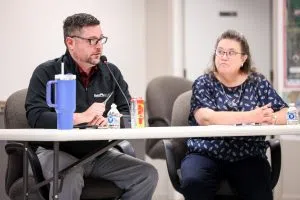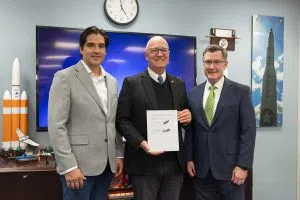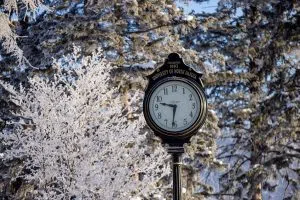 (Jeff Beach – North Dakota Monitor) –
(Jeff Beach – North Dakota Monitor) –
To Tony Gehrig, a former Fargo city commissioner, North Dakota’s Measure 4 property tax reform proposal eliminates an unfair tax structure and stimulates growth in the state.
For Tom Eblen, a farmer and Traill County commissioner, it’s a “bait-and-switch” scheme that will force the tax burden elsewhere and put more of it on North Dakota residents.
Gehrig was part of a panel leading a discussion of Measure 4 on Tuesday in Hillsboro. Eblen was part of the audience that was able to comment and ask questions of the four-person panel — two in favor and two against.
If passed in the Nov. 5 general election, Measure 4 would eliminate property taxes based on assessed value. The state would be obligated to provide local political subdivisions — counties, cities, schools districts — at the same level as the 2024 tax year.
Gehrig called it “repeal and replace.” He noted that local governments will still need to raise revenue as their budgets grow, but said there are many options to do that — such as road fees or a bus tax for schools. He also suggested that property can still be taxed, just not based on the assessed value.
Critics said the amount of tax revenue lost from out-of-state businesses and landowners will be shifted to North Dakota residents.
Eblen gave the example of a farmer who rents from an out-of-state landowner. “Do you think they’re going to give him a break on his land rent because you let him get off the hook? That’s not going to happen,” Eblen said.
He said school districts struggle to get bond issues passed to repair and build schools, and residents will balk at new forms of taxes.

Aaron Birst, executive director of the North Dakota Association of Counties, which opposes Measure 4, said local governments don’t even have the authority to raise revenue in all the ways that Gehrig suggested.
Birst said during the panel discussion that he understands the frustration with property taxes, especially in areas where property values are rising quickly, and recognizes that people want to see more action from the Legislature.
He said the $500 tax credit for a primary residence passed in 2023 may not seem like much to a Fargo-area homeowner paying thousands of dollars in property taxes, but that the idea has merit.
“I do think we should separate primary residence discussion on property taxes versus commercial,” Birst said.
Matt Perdue is the policy director for the North Dakota Farmers Union, the state’s largest farm group, which has come out against Measure 4 but supports property tax reform.
Perdue said he thinks Farmers Union members would have supported a measure that creates alternatives to property taxes for local governments. He said that would “empower local governments to make the best decisions.
Next to Gehrig at the “vote yes” table, was Charlene Nelson of Casselton, who led an effort to eliminate property taxes in 2012.
She called property taxes the worst kind of tax because it is not based on a person’s ability to pay, instead taxing the increased value of a home that the homeowner is unable to tap into, the equivalent of a capital gains tax.
“We should not punish you for buying that fixer-upper and fixing it up,” she said.
Audience member Bruce Bowersox of Hillsboro said that without a solid plan for how to replace the revenue, changing the state constitution to eliminate property taxes goes too far.
“I think that’s irresponsible,” he said.
A state estimate said the passage of Measure 4 would cost the state $3.15 billion for the 2025-27 budget cycle.

Nelson said lawmakers in support of Measure 4 are already drafting to address the issue in the 2025 legislative session. Supporters also argue that Measure 4 will force the state government to be more responsible with taxpayer money.
Nelson and Gehrig both said Measure 4 will lead to economic growth and reduce the state’s dependence on the oil industry and agriculture.
Nelson said it will give small businesses the same kind of tax breaks that are handed out to large businesses for economic development and residents will have more money to spend.
Nelson said that personally, she favors a sales tax over property taxes.
Perdue predicted that the state sales tax may have to double and exemptions could be eliminated, such as the one for fertilizer sales.
Daryl Osborn of Hillsboro came into the discussion undecided about Measure 4. He said a local sales tax doesn’t work in Hillsboro and Traill County that is close enough to Fargo and Grand Forks for residents to do most of their shopping in those cities. That benefits the more urban areas, but not the local budget.
He left the meeting still undecided but is sure of at least one thing.
“We are living beyond our means,” he said.









